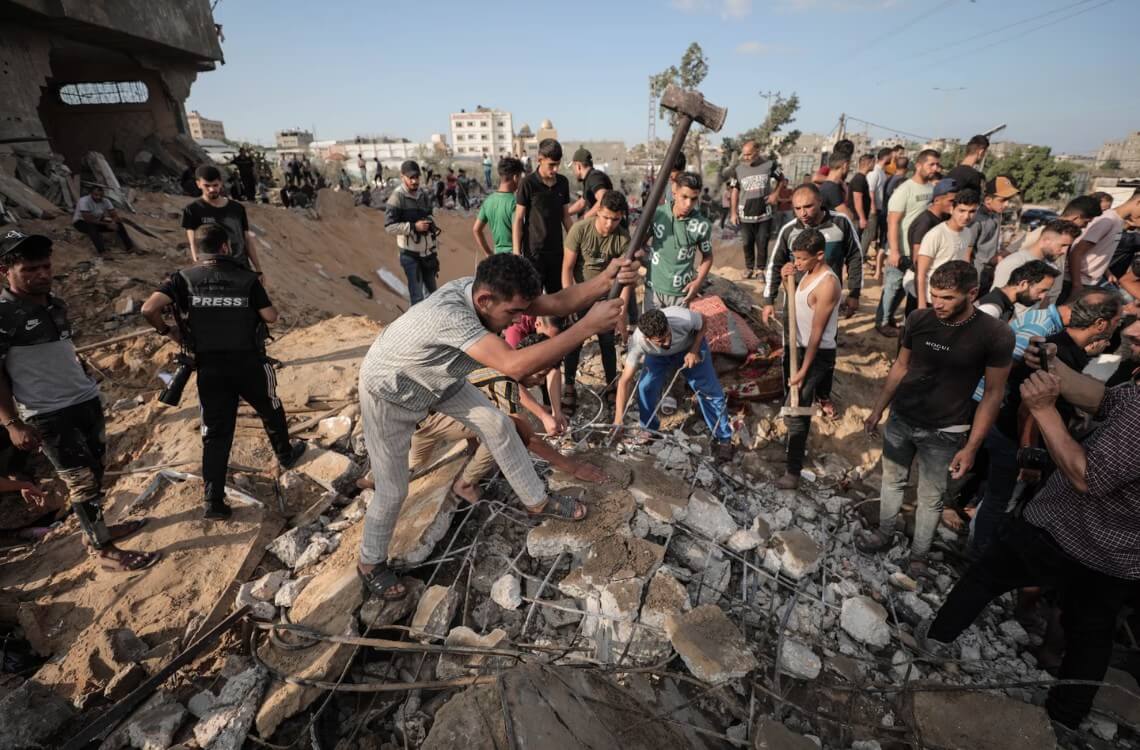As the crisis in the Middle East escalates, Israel is on the brink of launching a significant ground invasion into Gaza. This move comes amid a backdrop of mounting tensions not just in Gaza, but also along Israel’s northern border with Lebanon, underpinning the multifaceted challenges Israel faces in the region.
The Multi-Front Confrontation
The Israeli military’s recent strikes in Gaza, combined with attacks against Lebanon-based militants such as Hezbollah, underscore the nation’s determination to defend its territory.
This has been triggered, in part, by the recent assault by Hamas that resulted in the tragic death of over 1,400 Israelis. This marked the highest death toll in a single day for the Jewish community since the Holocaust.
The military’s response has been fierce; Israeli Defense Forces (IDF) recently reported the targeting and killing of a prominent Hamas commander, Billal Al Kedra, and the IDF’s top international spokesman, Lt. Col. Richard Hecht, openly stated their intent to neutralize other Hamas leaders.
Amid these aggressive measures, the international community is watching closely. The situation has attracted the attention of U.S. President Joe Biden, who expressed confidence in Israel’s approach.
“Israel is going after a group of people who have engaged in barbarism that is as consequential as the Holocaust. I think Israel has to respond,” he mentioned in a CBS’ “60 Minutes” interview.
Humanitarian Concerns Amidst Conflict
With tensions surging, there is a growing focus on the human cost of this conflict. As part of a collaborative effort to alleviate the humanitarian crisis in Gaza, the U.S. and Israel have brokered an agreement with Egypt.
This deal will permit American citizens to leave Gaza, transitioning through the Rafah crossing into Egypt, in exchange for essential humanitarian aid including water, food, and medical supplies.
However, the broader humanitarian picture remains grim. Reports from the Gazan Health Ministry indicate that the death toll from recent Israeli retaliatory attacks stands at a staggering 2,750, surpassing casualties from the 2014 war, Operation Protective Edge.
The U.N. has also highlighted the dire situation, emphasizing that water and fuel shortages in Gaza are endangering countless lives. Approximately one million Gaza residents have been displaced, with many seeking refuge in schools and shelters.
In a bid to mitigate the situation, Israel recently resumed water supply to southern Gaza, and the IDF announced a temporary three-hour pause in operations, urging civilians in northern Gaza to move south.
The uncertainty surrounding the impending ground assault is further complicated by weather conditions, with heavy rains potentially stalling the commencement of the invasion.
Israel’s cautionary approach is evident as they’ve urged residents of Sderot, an Israeli city in proximity to Gaza, to evacuate, highlighting the anticipated intensity of the impending operation.
International Involvement and Implications
The potential for a wider regional conflict remains a concern. This is emphasized by events such as Hezbollah’s targeting of security cameras along the Israel-Lebanon border, and the apparent redeployment of Iran’s Islamic Revolutionary Guard Corps closer to the Israeli border.
Tensions with Iran have been further aggravated, with an IDF spokesman accusing Tehran of instructing Hezbollah to intensify northern Israeli confrontations.
The ongoing crisis has prompted diplomatic engagements worldwide. Egyptian President Abdel Fattah Sisi has called for an international summit to discuss the Palestinian issue.
Concurrently, U.S. Secretary of State Antony Blinken has been in discussions with both Egypt and Saudi Arabia to find a path to deescalation and ensure that the conflict doesn’t expand further.
With Israel at the heart of this geopolitical storm, the world awaits to see how the nation navigates these turbulent waters, striking a balance between defense and diplomacy, while also addressing the escalating humanitarian crisis.





